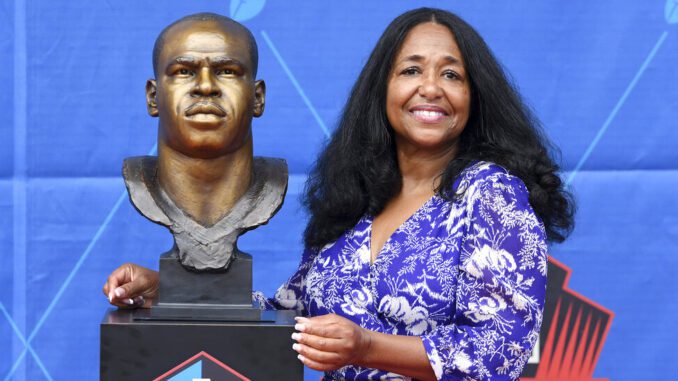
NEW ORLEANS — Perhaps the late Sam Mills would have been a blue-chip college recruit and high NFL Draft pick had someone invented — as the 5-foot-9 linebacker memorably suggested — “a computer to measure heart.”
Mills played Division III college football and was not drafted. That made his rise to stardom with the New Orleans Saints and Carolina Panthers — and his enshrinement in the Pro Football Hall of Fame in Canton, Ohio, last weekend — all the more remarkable.
The player nicknamed Field Mouse had the will to “keep pounding,” as he’d famously say. It made him an inspiration to people facing long odds in many aspects of life, whether they were undersized football prospects or cancer patients.
“I get emotional talking about him and I always have, because the darn guy was special,” said Jim Mora, who coached Mills in the USFL with the Philadelphia and Baltimore Stars, and then with the Saints. “I loved the guy.”
Former Saints quarterback Bobby Hebert was struck by how little Mills resembled an NFL player in public. Not only was Mills a bit shorter than the average guy on the street, but he wore prescription glasses and had an air of politeness and approachability.
“He was a straight-and-narrow, great guy, just down to earth,” Hebert said. “Not only was he a leader, like X’s and O’s, but also a spiritual leader. … Sam was as tough as they come on the field and a perfect gentleman off.”
Hebert also marveled at Mills’ ability to so thoroughly win over the fan bases of two longtime divisional rivals.
“You know, I go to the same division, from the Saints to the Falcons, and I’m a mercenary,” Hebert said. “Sam’s a hero for both” New Orleans and Carolina.
Outside the Panthers’ home stadium stands a statue of Mills wearing his No. 51 jersey. Mills spent the last three of his 12 NFL seasons in Carolina. In 1996, his second with the Panthers, he was named All-Pro. He also went into coaching with Carolina and was an assistant when he was diagnosed with intestinal cancer before the 2003 season.
Mills kept coaching during his treatment and made what is known as his “keep pounding” speech on the eve of the club’s Super Bowl matchup with New England at the end of that season.
“When I found out I had cancer, there were two things I could do: quit or keep pounding,” Mills said then. “I’m a fighter. I kept pounding. You’re fighters, too. Keep pounding!”
The quarterback of that Panthers team was Louisiana native Jake Delhomme, who grew up watching Mills call the Saints’ pre-snap defensive signals, fearlessly shed blocks from offensive linemen who dwarfed him and then plant ball carriers on their backs.
“I always kind of revered Sam Mills,” Delhomme said. “I was that young kid that was like: ‘Man, that’s the undersized guy. That’s the guy that made it. That’s the Field Mouse.’”
During the speech, “You felt that emotion,” Delhomme recalled. “It was like, ‘Oh my God, let’s put on the uniform now. Let’s play right now!’”
But Delhomme’s most poignant memory of Mills came earlier that season, a few days after a loss to Dallas. Delhomme recalled feeling sore, sluggish and uncharacteristically sorry for himself as he walked to practice. Then Mills jogged past, slapped Delhomme on the back side and said, “Let’s go get better.”
Delhomme refers to that moment as an awakening in which he told himself: “You need to grow up and try to be just a tenth of this guy.”
“Everybody knew he was dying,” Delhomme continued. “He was doing chemo. And he’s running out to practice … and he’s going to coach his ass off.”
Mills was just 45 when he died in April 2005. “Keep pounding” remains the Panthers’ tag line.
“He lived ‘keep pounding,’ and it resonates with people because it’s real and because it’s not just a sports thing,” said Mills’ eldest son, Washington Commanders defensive assistant coach Sam Mills III.
In 181 NFL games, Mills made 1,265 tackles, had 23 fumble recoveries, forced 22 fumbles, had 20 1/2 sacks and intercepted 11 passes. He also was part of the first four playoff teams in New Orleans Saints history and the first in Panthers history.
“It was hard to find negatives about the guy on or off the field,” Mora said. “He probably would have had a great future as a coach. He knew the game, he studied the game and always prepared mentally. Players would have loved playing for him.”
Mora has coached other Hall of Fame players — household names including quarterback Peyton Manning and receiver Marvin Harrison. Seeing Mills enter the Hall will be gratifying for Mora in a different way.
Many football fans “don’t know Sam Mills unless they are astute, older football guys,” Mora said. “He’s one of the best guys I ever coached, but I always have to explain a little bit about who Sam Mills was.”
Maybe less so after Mills’ enshrinement.



